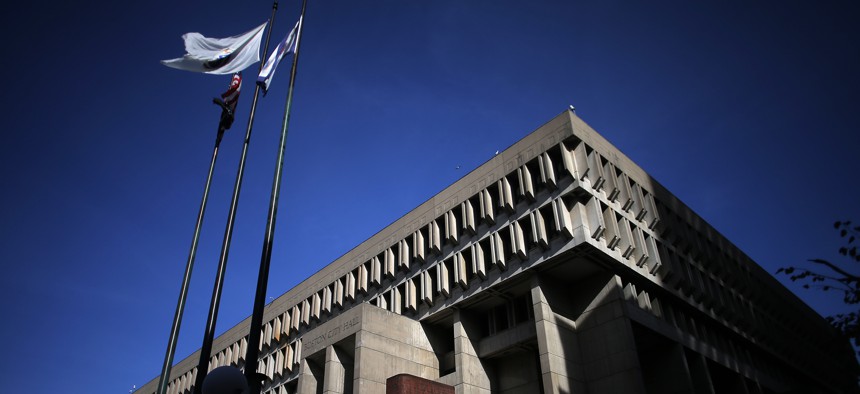Supreme Court Sides Against Boston in Christian Flag Dispute

Flags fly above Boston City Hall on Nov. 11, 2021. Lane Turner/The Boston Globe via Getty Images
The case centered on the First Amendment and a flagpole outside of City Hall.
The city of Boston must allow Christian groups to raise a religious flag in front of City Hall, as long as it lets other groups display flags of their choice too, the U.S. Supreme Court ruled Monday.
All of the court’s judges ruled against Boston. City officials said they couldn’t allow the Christian group to hoist their banner, because the Constitution prohibits governments from making laws “respecting an establishment of religion.” The high court has prohibited other types of religious symbols on public grounds, like public parks and courthouses, in other situations.
But the Supreme Court on Monday said those cases were different, because of how much control the government asserted over those displays. Boston, by comparison, didn’t have any guidelines for what could and could not be shown on the flagpole. City officials had allowed outside groups to raise flags representing everything from LGBTQ pride to local credit unions, the court noted.
“The city’s lack of meaningful involvement in the selection of flags or the crafting of their messages leads us to classify the flag raisings as private, not government, speech—though nothing prevents Boston from changing its policies going forward,” Justice Stephen Breyer wrote for the court.
Breyer taught law at Harvard University and was a federal judge in Boston. He is retiring from the Supreme Court next month, after the court’s term ends.
Boston Mayor Michelle Wu’s office indicated that it would take another look at how the city handled flag-flying requests. The case began years before Wu took office in January.
“We are carefully reviewing the Court’s decision and its recognition of city governments’ authority to operate similar programs,” Wu’s office said in a statement. “As we consider next steps, we will ensure that future City of Boston programs are aligned with this decision.”
In the court’s decision, Breyer noted that other cities had done more to police the kind of messages they allowed to be shared on their flagpoles. The city of San Jose, California, in fact, has a written policy that “flagpoles are not intended to serve as a forum for free expression by the public” and has a list of flags that are allowed to be flown on city property.
The flagpole at the center of the Boston controversy is one of three outside City Hall. One displays the U.S. flag, a second flies the Massachusetts state flag and the third usually shows the city’s flag.
About 20 times a year, though, the city has let other groups replace the city flag with one of their choosing, and that is how the court case started.
The controversy began in 2017 when the city refused to let Harold Shurtleff, the director of a group called Camp Constitution, fly a Christian flag from the third flagpole. City officials worried that allowing the group to display a religious symbol would be a violation of the First Amendment.
Justice Samuel Alito criticized the approach that Breyer and five other judges used to determine whether the flags amounted to government speech.
Breyer’s decision focused on how much control the government had on the type of speech, the history of the form of expression and the public’s perception about whether the government supported the messages in question.
Alito said the focus instead should be on “whether the government is speaking instead of regulating private expression.”
Justices Clarence Thomas and Neil Gorsuch joined in Alito’s concurring opinion.
Daniel C. Vock is a senior reporter for Route Fifty based in Washington, D.C.
NEXT STORY: 5 Ways to Reduce Gun Violence






